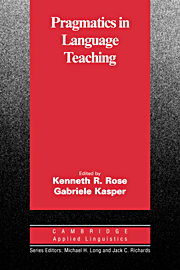Book contents
- Frontmatter
- Contents
- List of contributors
- Series editors' preface
- Preface
- Chapter 1 Pragmatics in language teaching
- I THEORETICAL AND EMPIRICAL BACKGROUND
- II ISSUES IN CLASSROOM-BASED LEARNING OF PRAGMATICS
- III THE EFFECTS OF INSTRUCTION IN PRAGMATICS
- IV THE ASSESSMENT OF PRAGMATIC ABILITY
- References
- Name index
- Subject index
II - ISSUES IN CLASSROOM-BASED LEARNING OF PRAGMATICS
Published online by Cambridge University Press: 05 October 2012
- Frontmatter
- Contents
- List of contributors
- Series editors' preface
- Preface
- Chapter 1 Pragmatics in language teaching
- I THEORETICAL AND EMPIRICAL BACKGROUND
- II ISSUES IN CLASSROOM-BASED LEARNING OF PRAGMATICS
- III THE EFFECTS OF INSTRUCTION IN PRAGMATICS
- IV THE ASSESSMENT OF PRAGMATIC ABILITY
- References
- Name index
- Subject index
Summary
The chapters in Part II explore a variety of issues in the classroom learning of different aspects of L2 pragmatics. Rather than examining directly the effects of particular approaches to instruction (discussed in Part III), the focus here is on the incidental acquisition (or nonacquisition) of pragmatics that results from classroom language learning. Chapters 4 and 5 (Niezgoda and Röver, Cook) explore learners' interlanguage pragmatic knowledge as the result of L2 (classroom) learning, but without examining empirically how these learning outcomes relate to classroom processes or specific instructional measures. These studies are thus classroom-oriented rather than classroom-based (Nunan, 1991). Kimberly Niezgoda and Carsten Röver replicated Bardovi- Harlig and Dörnyei's (1998) study on the effects of learning environment and proficiency on learners' awareness of pragmatic and grammatical errors in the target language. The previous study had found that learners in the second language setting had stronger awareness of pragmatic than of grammatical errors, whereas learners in the foreign language setting were more aware of grammatical than of pragmatic errors. For their study, Niezgoda and Röver used the same videoprompted task requiring participants to distinguish grammatical from pragmatics errors, and to rate both for seriousness. Although their ESL sample was generally comparable to that in the original study, their EFL group was markedly different in that it consisted of a highly select group of learners who had gained entrance to an English-language teacher-training program at a prestigious Czech university.
- Type
- Chapter
- Information
- Pragmatics in Language Teaching , pp. 61 - 62Publisher: Cambridge University PressPrint publication year: 2001

